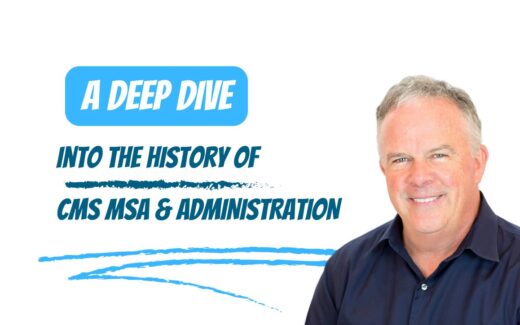If carriers fail to reasonably consider Medicare’s interest in a settlement, they risk having a settlement disregarded and it puts beneficiaries at risk of having their benefits denied, potentially impacting their care.
Understanding the history of Medicare Set Asides (MSAs) and professional administration, and the steps the Centers for Medicare and Medicaid Services (CMS) has taken in recent years, is critical in best protecting settlements and beneficiaries.
MSP History
The original Social Security Act was amended with the inclusion of Medicare in 1965. Medicare is a primary payer for all beneficiary medical bills except if there were veterans’ benefits, Black Lung protection, or workers’ compensation coverage. Those three benefit systems were supposed to be primary, with Medicare secondary. The Medicare Secondary Payer (MSP) Act was expanded in 1981 to all other insurance lines. The intent of the MSP Act is to ensure the financial integrity of the Medicare fund.
The overriding concept to the MSP Act is cited at 42 U.S.C. 1395y(b)(2), which states that “Medicare will not be responsible for medical payments when there is a primary payer; and accordingly, Medicare’s interests must be considered and adequately protected in any settlement which forecloses future medical expenses.”
The MSP Act prohibits the shifting of future medical burden to Medicare and ensures Medicare’s interest must be considered in any settlement that resolves future medical. Medicare continues to tighten their compliance controls with the reality of Medicare beneficiaries having their injury-related benefits denied post-settlement for failure to properly administer their Medicare Set Aside (MSA) funds.
CFR 411.46(b)(2) addresses lump-sum compromise settlements, emphasizing that if a settlement appears to represent an attempt to shift the responsibility for paying medical expenses related to a work injury onto Medicare, the settlement will not be recognized.
Considering Medicare’s Interest in a Settlement
The first guidance memo providing direction to carriers on how to consider Medicare’s interest was published in July 2001, known as the “Patel Memo.” This memo brought to light considering Medicare’s interests in medical settlements. The memo established the Centers for Medicare & Medicaid Services (CMS) to ensure compliance, and CMS established voluntary workload thresholds for MSAs. Settlements below the review thresholds should still consider Medicare’s interests as there would be no safe harbors. CMS issued a series of memos following the Patel Memo, providing guidance to settling parties. These memos were consolidated into the Workers’ Compensation Medicare Set Aside (WCMSA) Reference Guide.
The WCMSA Reference Guide, WCMSA Approval, and Professional Administration
In the WCMSA Reference Guide: 4.2: Indications That Medicare’s Interests are Protected, CMS speaks about the recommended WCMSA review process.
CMS’ voluntary, yet recommended, WCMSA amount review process is the only process that offers both Medicare beneficiaries and Workers’ Compensation entities finality, with respect to obligations for medical care required after a settlement, judgment, award, or other payment occurs. When CMS reviews and approves a proposed WCMSA amount, CMS stands behind that amount. Without CMS’ approval, Medicare may deny related medical claims, or pursue recovery for related medical claims that Medicare paid up to the full amount of the settlement, judgment, award, or other payment.
While the industry focuses heavily on preparing and submitting recommended WCMSA’s, the crucial role of professional administration often receives less attention.
CMS speaks even more strongly about professional administration with administration being “highly recommend” twice in the WCMSA Reference Guide.
This supports the importance of MSA professional administration, helping to alleviate the challenges injured workers can face post settlement, including the concern of denials. Professional administration can improve the injured worker experience and help preserve the Medicare fund.
WCMSA Administration Guidance
The WCMSA Reference Guide discusses MSA Account Set-Up and Administration in Section 17, and CMS also published the WCMSA Self-Administration Toolkit that serves to help injured parties understand the guidelines for managing their MSA funds. These two guides are the controlling document(s) with respect to policies and procedures for WCMSAs.
CMS expects that WCMSA funds be competently administered in accordance with all Medicare coverage guidelines, including but not limited to CMS Part D Drug Utilization Review policy.
“…Although beneficiaries may act as their own administrators, it is highly recommended that settlement recipients consider the use of a professional administrator for their funds.”
“Claimants should submit annual self-attestations, just as a professional administrator would. This arrangement is subject to the same rules and reporting requirements as any other WCMSA.”
Regardless of which administration option is chosen, there are certain CMS administration guidelines that must be followed to avoid jeopardizing future injury-related coverage. Injured workers are expected to:
- Place the MSA funds in a separate interest-bearing account
- Understand the pricing fee schedule when discussing fees with their physicians
- Review medical bills
- Only pay for work-related treatment otherwise covered by Medicare
- File annual attestation to support monies paid out of the account
Section 10 of the Guide, Consent to Release Note, outlines the process of consent and authorization in allowing CMS to discuss the case/medical condition with the parties identified on the authorization regarding the Workers’ Compensation settlement that includes a WCMSA. Once again, the issue of administration is referenced. The note must include language indicating that the beneficiary reviewed the MSA submission package and understands the WCMSA intent, submission process, and associated administration.
The Risks of Self-Administration
Self-administration poses a variety of risks to both the beneficiary and the payer. A common scenario includes one where the injured worker decides to self-administer their MSA and pre-maturely exhausts the funds leading to a denial of future care by Medicare. In this instance, it is possible that the beneficiary could attempt to reopen the claim resulting in a disruption of care and heightened litigation costs causing deficient healthcare for the beneficiary and reputational harm to the payer. Other risks could surface as well:
- Was the MSA submission and administration of the MSA properly explained to them?
- Was the MSA a non-submit case?
- What does the settlement language state concerning Medicare’s interests?
Further complicating the duty of administration is recent CMS guidance which added additional reporting responsibilities for beneficiaries with MedAdvantage and Prescription Part D coverage necessitating the need to notify such plans of their MSA.
CMS understands that beneficiaries are under a great deal of responsibility to properly manage their MSA funds over lifetime or potentially lose their rights to Medicare coverage for the work-related injury. CMS has attempted to simplify the complex world of administration with the 31-page toolkit and other resources. In reality, many injured workers either do not understand their responsibilities or are not able to keep up with the management of their account. Professional administration simplifies the coordination of healthcare post settlement and helping maintain Medicare coverage for the injured worker. Professional administration also offers beneficiaries provider networks that help save on medical expense and prolonging the life of the funds.
When evaluating the WCMSA Reference Guide, the word “must” arises 91 times, the word “administration” is mentioned 43 times as well as 4 references of the word “denial.” All three words suggest the need for administration or otherwise face the real possibilities of future benefit denial. One of the words not used is “educate,” which professional administrators do daily with settling parties, an additional value proposition that professional administration brings to the process. In short, professional administrators simplify life after settlement, ensure security of the funds, and provide support for life.
If you have any questions about how Ametros can help navigate CMS’ WCMSA guidance or how Ametros simplifies and supports MSA administration and other future medical allocations post-settlement, don’t hesitate to get in touch with us.



